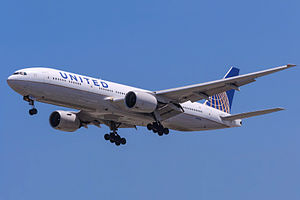777-200ER
| Boeing 777 | |
|---|---|
 |
|
| Boeing 777-200ER of United Airlines, the launch customer of the Boeing 777 | |
| Role | Wide-body jet airliner |
| National origin | United States |
| Manufacturer | Boeing Commercial Airplanes |
| First flight | June 12, 1994 |
| Introduction | June 7, 1995, with United Airlines |
| Status | In service |
| Primary users |
Emirates United Airlines Cathay Pacific Air France |
| Produced | 1993–present |
| Number built | 1,467 through February 2017 |
| Unit cost |
777-200ER: US$261.5 million
777-200LR: US$296.0 million 777-300ER: US$320.2 million 777F: US$300.5 million |
| Developed into | Boeing 777X |
The Boeing 777 is a family of long-range wide-body twin-engine jet airliners developed and manufactured by Boeing Commercial Airplanes. It is the world's largest twinjet and has a typical seating capacity of 314 to 396 passengers, with a range of 5,240 to 8,555 nautical miles (9,704 to 15,844 km). Commonly referred to as the "Triple Seven", its distinguishing features include the largest-diameter turbofan engines of any aircraft, six wheels on each main landing gear, fully circular fuselage cross-section, and a blade-shaped tail cone. Developed in consultation with eight major airlines, the 777 was designed to replace older wide-body airliners and bridge the capacity difference between Boeing's 767 and 747. As Boeing's first fly-by-wire airliner, it has computer-mediated controls. It was also the first commercial aircraft to be designed entirely with computer-aided design.
The 777 is produced in two fuselage lengths as of 2017[update]. The original 777-200 variant entered commercial service in 1995, followed by the extended-range 777-200ER in 1997. The stretched 777-300, which is 33.25 ft (10.1 m) longer, followed in 1998. The initial 777-200, -200ER and -300 versions are equipped with General Electric GE90, Pratt & Whitney PW4000, or Rolls-Royce Trent 800 engines. The extended-range 777-300ER and ultra long-range 777-200LR variants entered service in 2004 and 2006 respectively, while the 777F, a freighter version, debuted in February 2009; these variants all feature high-output GE90 engines and extended raked wingtips. The 777-200LR is the world's longest-range airliner, able to fly more than halfway around the globe, and holds the record for the longest distance flown non-stop by a commercial aircraft.
...
Wikipedia
